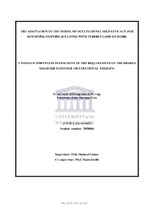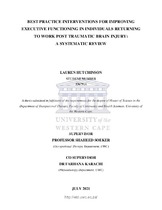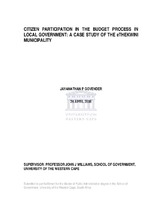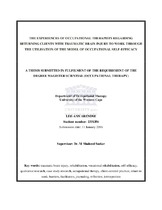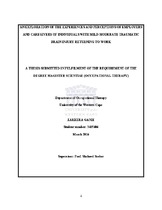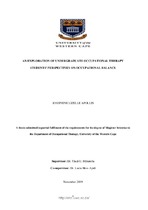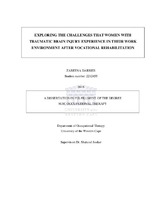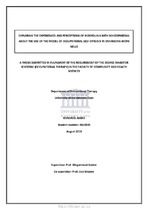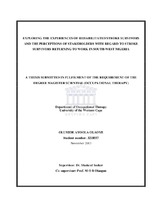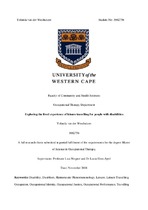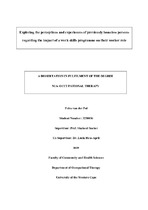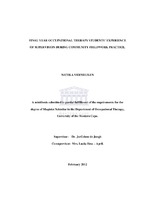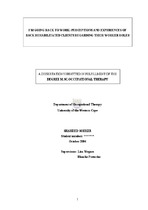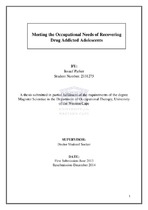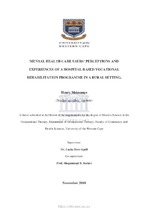Browsing Magister Scientiae - MSc (Occupational Therapy) by Title
Now showing items 1-20 of 35
-
The adaptation of the model of occupational self-efficacy for returning individuals living with tuberculosis to work
(University of the Western Cape, 2018)Tuberculosis (TB) and multi-drug resistant (MDR) TB have been identified as one of the largest health problems in the world, and notably recognized as a big issue in democratic South Africa. Socio-demographic factors such ... -
Best practice interventions for improving executive functioning in individuals returning to work post traumatic brain injury: A systematic review
(University of Western Cape, 2021)The recovery process for traumatic brain injuries (TBIs) can be lengthy and taxing on the patient, family and healthcare resources. Part of this recovery process includes interventions for the improvement of executive ... -
The effect of an injury prevention programme on the lower limb soft tissues in fast bowlers an intervention study
(University of the Western Cape, 2008)The aim of the study was to determine the effect of astatic stretching programme on injury prevention. Educational pamphlets and a static stretching regime were implemented to the experimental group. -
The experiences and perceptions of individuals with stroke about the usefulness of the model of occupational self efficacy in a rural setting
(University of the Western Cape, 2019)Individuals diagnosed with stroke particularly in rural communities have a poor return to work rate. Vocational rehabilitation has been used as an intervention strategy with various types of clients with disability or ... -
Experiences of caregivers of children with spastic cerebral palsy regarding splinting in Uganda
(2013)Splinting is one of the many strategies used globally for managing neuromuscular impairments related to cerebral palsy. In Uganda, some children with cerebral palsy who have been provided with splints return to the ... -
The experiences of occupational therapists regarding returning clients with traumatic brain injury to work through the utilisation of the Model of Occupational Self-efficacy
(University of the Western Cape, 2016)Traumatic brain injury (TBI) is a major public health concern which mostly affects the economically viable population. In addition, the Code of Good Practice as described in South African Labour Law serves as a guide for ... -
An exploration of the experiences and perceptions of employers and caregivers of individuals with mild-moderate traumatic brain injury returning to work
(University of the Western Cape, 2016)An estimate of 89 000 cases of new traumatic brain injuries (TBI) are reported annually in South Africa. South African legislation advocates for the employment of persons with a disability. Individuals with mild-moderate ... -
An exploration of the experiences and perceptions of TBI survivors about accessing rehabilitation during the COVID-19 pandemic and how this has affected their worker roles
(University of the Western Cape, 2022)Traumatic brain injury (TBI) often results in residual cognitive, behavioural, physical, and functional impairments that may influence the person’s independence in most areas of occupation, including work. Few resources ... -
An exploration of undergraduate Occupational therapy students’ perspectives on occupational balance
(University of Western Cape, 2019)Occupational justice empowers individuals, especially the previously disadvantaged, to have their basic needs met, as well as turn their potential into reality, through human rights and labour legislation, which provides ... -
Exploring the challenges that women with traumatic brain injury experience in their work environment after vocational rehabilitation
(University of the Western Cape, 2015)Traumatic brain injury (TBI) has enjoyed extensive research and several therapeutic modalities, approaches and models have been developed where the main outcomes are focused on the successful return to work of individuals ... -
Exploring the experiences and perceptions of individuals with schizophrenia about the use of the model of occupational self-efficacy in enhancing work skills
(University of the Western Cape, 2018)Globally, high unemployment rates exist amongst individuals with schizophrenia. Evidence suggests that these individuals have a desire to return to work (RTW), however, they experience difficulty in finding as well as ... -
Exploring the experiences of rehabilitated stroke survivors and the perceptions of stakeholders with regard to stroke survivors returning to work in South-West Nigeria
(University of the Western Cape, 2013)Stroke has been identified as a global cause of neurological disability with a resultant burden shared not only by the survivor but also by the society. The resumption of one’s role as a worker after having a stroke is an ... -
Exploring the lived experience of leisure travelling for people with disabilities
(University of the Western Cape, 2018)Historically travelling was an option only for the affluent; however, with the turn of the 20th century, travelling shifted to an important form of free-choice learning by means of discovery. Travelogues of able-bodied ... -
Exploring the perceptions and experiences of previously homeless persons regarding the impact of a work skills programme on their worker role
(University of the Western Cape, 2020)Globally, high rates of homelessness exist and continue to grow, despite interventions offered by government and suggested by policy. Evidence suggests that long term intervention and vocational skill development can ... -
Exploring the sensory compatibility of ten children with autism and their mothers
(University of the Western Cape, 2008)Children with autism typically present with sensory processing difficulties that affect their ability to relate to people. This qualitative study focused on exploring the sensory processing of children with autism and their ... -
Final year occupational therapy students' experience of supervision during community fieldwork practice
(University of the Western Cape, 2012)Fieldwork is seen to be an essential component in the curriculum of an undergraduate occupational therapy (OT) program through which students develop their professional behavior and apply theoretical education to ... -
I'm going back to work: perceptions and experiences of back rehabilitated clients regarding their worker roles
(University of the Western Cape, 2004)Clinical research has shown that patients experience difficulty in adjusting to their pre-morbid worker roles after they have been through a back rehabilitation programme. The pressure and competitiveness of modern day ... -
Investigating the prevalence of health risk behavior and the association with leisure boredom among high school students in Lagos, Nigeria
(University of Western Cape, 2019)Health risk behaviors are public health problems which are of concern in occupational therapy because they tend to be the causes of disability and death among adolescents and youths in the world. Identifying risk factors ... -
Meeting the occupational needs of recovering drug addicted adolescents
(University of the Western Cape, 2014)The growing phenomenon of drug abuse has alerted the attention of health professionals, addiction counsellors, school educators, the media and community members. Susceptible sub groups of the population such as adolescents ... -
Mental health care users’ perceptions and experiences of a hospital-based vocational rehabilitation programme in a rural setting
(University of the Western Cape, 2018)Return to work is a recognised goal of rehabilitation by the occupational therapy discipline that is addressed through vocational rehabilitation as a key feature of work practice. Programmes that fall under the umbrella ...

